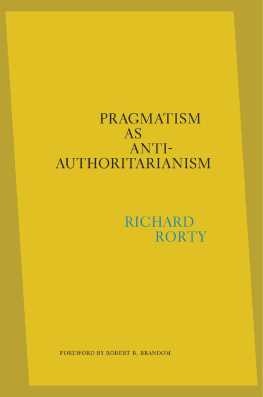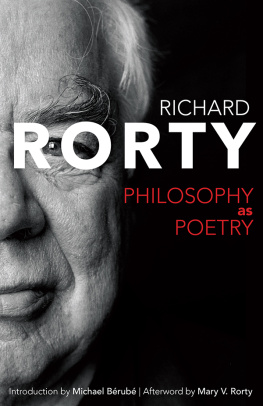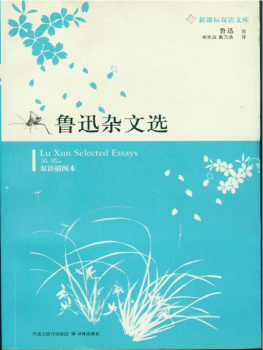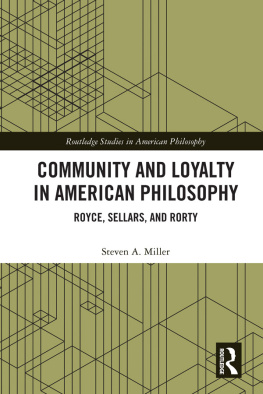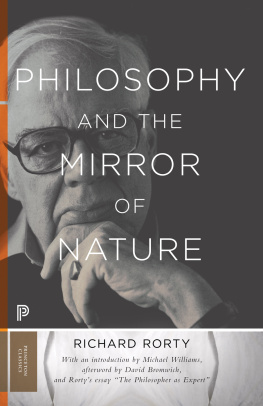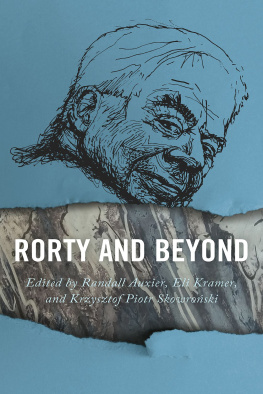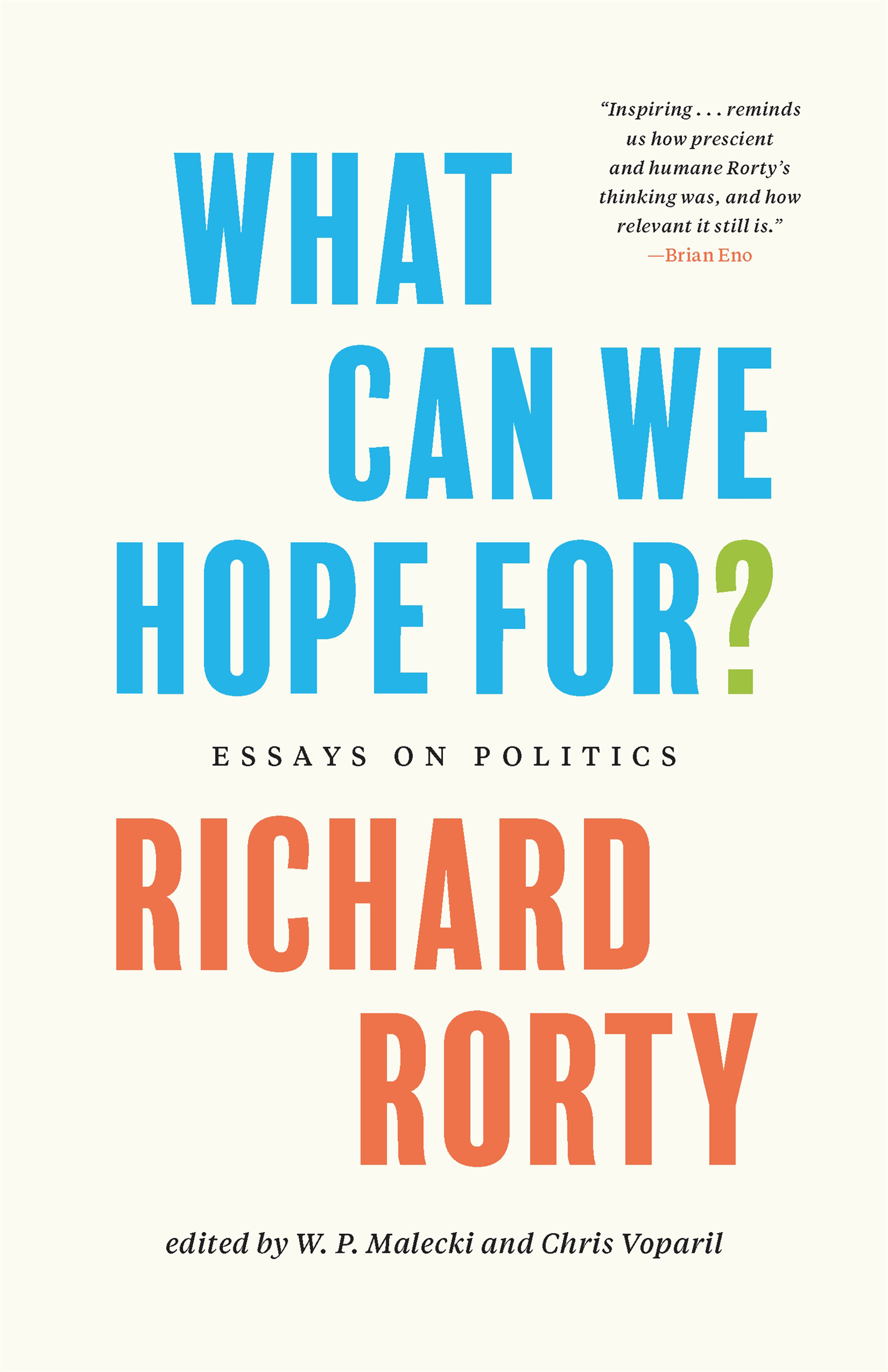WHAT CAN WE HOPE FOR?
WHAT CAN WE HOPE FOR?
ESSAYS ON POLITICS
RICHARD RORTY
Edited by W. P. Malecki and Chris Voparil
PRINCETON UNIVERSITY PRESS
PRINCETON & OXFORD
Copyright 2022 by Princeton University Press
Princeton University Press is committed to the protection of copyright and the intellectual property our authors entrust to us. Copyright promotes the progress and integrity of knowledge. Thank you for supporting free speech and the global exchange of ideas by purchasing an authorized edition of this book. If you wish to reproduce or distribute any part of it in any form, please obtain permission.
Requests for permission to reproduce material from this work should be sent to
Published by Princeton University Press
41 William Street, Princeton, New Jersey 08540
99 Banbury Road, Oxford OX2 6JX
press.princeton.edu
All Rights Reserved
Library of Congress Cataloging-in-Publication Data
Names: Rorty, Richard, author. | Maecki, Wojciech (Professor of literary theory), editor. | Voparil, Christopher J., 1969 editor.
Title: What can we hope for? : essays on politics / Richard Rorty ; edited by W.P. Malecki and Chris Voparil.
Description: Princeton, New Jersey : Princeton University Press, 2022. | Includes bibliographical references and index.
Identifiers: LCCN 2021034288 (print) | LCCN 2021034289 (ebook) | ISBN 9780691217529 (acid-free paper) | ISBN 9780691217536 (ebook)
Subjects: LCSH: Political cultureUnited States. | Democracy. | GlobalizationPolitical aspects.
Classification: LCC JK1726 .R727 2022 (print) | LCC JK1726 (ebook) | DDC 320.973dc23
LC record available at https://lccn.loc.gov/2021034288
LC ebook record available at https://lccn.loc.gov/2021034289
Version 1.0
British Library Cataloging-in-Publication Data is available
Editorial: Rob Tempio, Matt Rohal, and Chloe Coy
Production Editorial: Natalie Baan
Text Design: Karl Spurzem
Jacket Design: Lauren Michelle Smith
Production: Erin Suydam
Publicity: Carmen Jimenez and James Schneider
Copyeditor: Hank Southgate
For
Antoni, Julia, and Pola
Aidan and Devin
What matters for pragmatists is devising ways of diminishing human suffering and increasing human equality, increasing the ability of all children to start life with an equal chance of happiness.
RICHARD RORTY
CONTENTS
- ix
- xi
- W. P. Malecki and Chris Voparil
ACKNOWLEDGMENTS
We are grateful for Mary Varney Rortys unwavering support for this project. The final version in your hands benefited significantly from the insightful eye of Rob Tempio at Princeton University Press, whose enthusiasm and encouragementand good humorwere crucial throughout the process, and from helpful comments from two anonymous reviewers. Our thanks go to Matt Rohal and the fine editorial staff who saw the manuscript to fruition, and to the staff of the UC Irvine Special Collections and Archives, Critical Theory Archive, where the Richard Rorty Papers are located, in particular to Steven McLeod and Audra Eagle Yun. We also want to acknowledge the countless colleagues who have shared their wisdom about Rortys political thought with us over the years. There are too many to list, but we must thank Dick Bernstein, Eduardo Mendieta, and the members of the Richard Rorty Society. Our hope is that this volume of Rortys crucial and still timely writings on politics shall stimulate commitment to continuing his unfinished pragmatist project of diminishing human suffering and increasing human equality for generations to come.
NOTE ON SOURCES
Most of the essays included in this volume were previously published, as listed below. Four essays are based on electronic documents from the born-digital archive of the Richard Rorty Papers, MS-C017, Special Collections and Archives, The UC Irvine Libraries, Irvine, California, http://ucispace.lib.uci.edu/handle/10575/7. In the following, we provide what we have been able to gather about dates and occasions of the unpublished papers.
Our minimal editorial interventions in preparing the unpublished manuscripts fell into two categories. First, we removed the obvious traces of the papers original contexts of presentation. For instance, the original text for the lecture American Universities and the Hope for Social Justice included in the time that remains, which we altered to in the space that remains. These editorial interventions were limited to obvious traces of oral presentation that could be changed without affecting the content and tone of the text. We did not intervene in the style or syntax. The second type of intervention relates to Rortys famous habit of name-dropping, where he would simply say that a given thinker claims p or q without giving any reference to the relevant work by that author or even his or her first name. Normally, an editors job would be to locate the relevant source and add the first name of a given author when he or she is cited the first time. However, since Rortys practice of name-dropping was a characteristic element of his style, we usually chose not to do so. The exceptions were cases where, for example, in Back to Class Politics, Rorty alludes to as John Sweeney reminds us in his book with no citation, presumably because he assumed an audiences awareness at the time. In cases like this, we decided to add references to the works Rorty most likely had in mind, distinguishing our footnotes from Rortys with Eds.
- Who Are We? Moral Universalism and Economic Triage appeared in Diogenes 173 (1996): 515. Reprinted with permission of Sage Publishing.
- Democracy and Philosophy was published in Kritika & Kontext 33 (2007): 825. Reprinted with permission from the Estate of Richard Rorty.
- Dewey and Posner on Pragmatism and Moral Progress was published in the University of Chicago Law Review 74, no. 3 (2007): 91527. We gratefully acknowledge permission to reprint.
- Rethinking Democracy (1996). Manuscript reproduced with permission from the Estate of Richard Rorty.
- First Projects, Then Principles appeared in The Nation, May 19, 1997, 9. We gratefully acknowledge permission to reprint.
- Does Being an American Give One a Moral Identity? (1998). Manuscript reproduced with permission from the Estate of Richard Rorty.
- Demonizing the Academy was published in Harpers Magazine, January 1995, 1317. Reprinted with permission from the Estate of Richard Rorty. A slightly modified version appears in the Journal of Blacks in HigherEducation, no. 7 (Spring 1995): 7475, under the title The Demonization of Multiculturalism.
- American Universities and the Hope for Social Justice (2001). Manuscript reproduced with permission from the Estate of Richard Rorty.
- The Intellectuals and the Poor (1996). Manuscript reproduced with permission from the Estate of Richard Rorty. This text is based on a lecture given at Pomona College on February 19, 1996. There are two additional versions in the archive, edited by Rorty himself in 1997 and in 2001. This version is based on the 2001 text, with unfinished portions and a separate opening section omitted.
- Can American Egalitarianism Survive a Globalized Economy? appeared in the Ruffin Series of the Society for Business Ethics 1 (1998): 16, https://doi.org/10.5840/ruffinx199819. We gratefully acknowledge permission to reprint.


